Business life cycle: preparing for the peak season
They say that if you sell sweets, then the whole year you slowly and sadly lose money, and only in the last two weeks of December come off and get super profits. If you are trading in flowers, the situation is similar, only you are working around zero and coming off on March 8th.
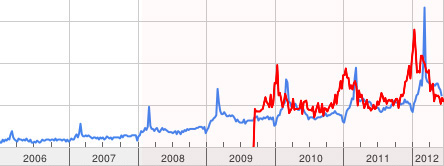
Business Cardiograms
Almost every business - from trade in vodka to IT-projects - has seasonal fluctuations. They need to be taken into account in the cycles of preparation, development, in finance and in technical moments before the peak (such as reservation of channels).
')
Here are a few practical points:

Trends of colors (blue graph) and board games. Normalization and overlay: in reality, there are many more colors than board games. Here you can clearly see the difference in phases between the New Year and March 8.

And here is the data of Yandex WordStat for the query “board games”. Across Moscow approximately correspond to the real schedule of demand for these games.
Below are charts of five different products.
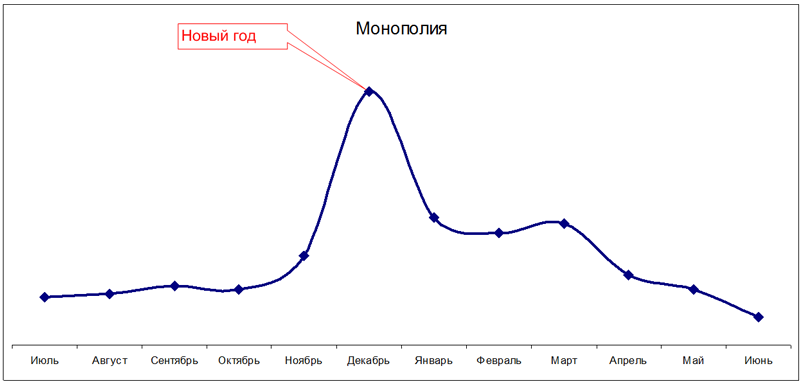
The first is Monopoly , it is a “default game” for an abstract average client (the same one, statistically with one breast and one egg). The demand graph of this piece roughly corresponds to the overall demand schedule on the network. It is convenient to know such a reference product in each niche of the market: according to it, it is possible to count the forecasts of new products that are included in this niche. For example, if another Monopoly is released now, we will already know more or less exactly how much and when to buy it.

The second example is Towns . In winter, the sale of Gorodok is almost unreal (although I saw how they were bought after the phrase “What do you mean, it's two bits in the trunk”), but in summer they are at their peak. Approximately the same schedule will be for a product with a similar consumption profile. When we put in the network inhumanly healthy water blasters, we already knew how they would be sold and in what month due to the extrapolation of data on the Towns.
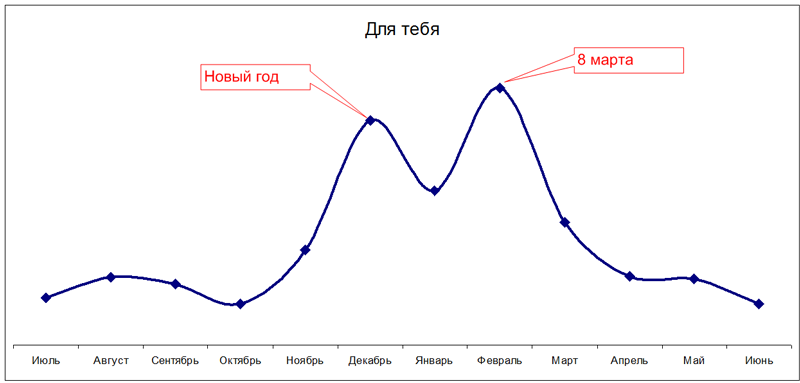
The third example is the game “ For you ”, there are 15 beautiful romantic tasks for a man and a woman there. An obvious peak is the international sexual holidays, especially on February 14 (as suggested in the comments, the signature on the March 8 error is).
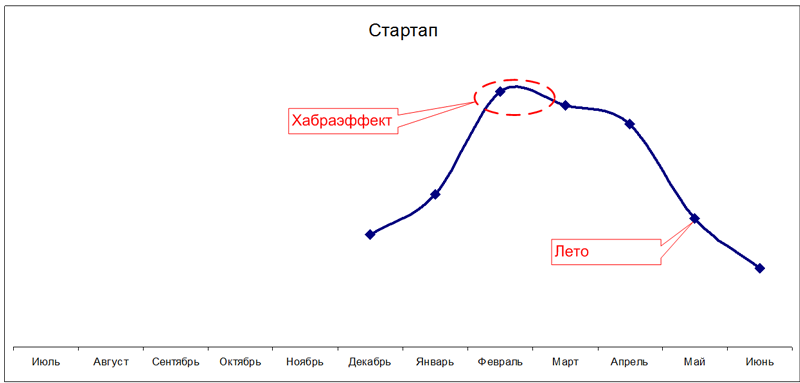
On the habraigra “Startup” graph, you can see fluctuations that overlap the seasonal and generally look illogical. These are promotions and promotions. In our particular case - two habraeffekt plus logistic lag for delivery by region. The peak in early summer is a corporate order for gifts to employees and journalists. A start-up is an example of the fact that the season is a season, but promotional activity can safely block all the trends. At the same time, we still do not know the seasonality of the goods, because there are no analogues, therefore, we build the forecast on the basis of the averaged Monopoly.
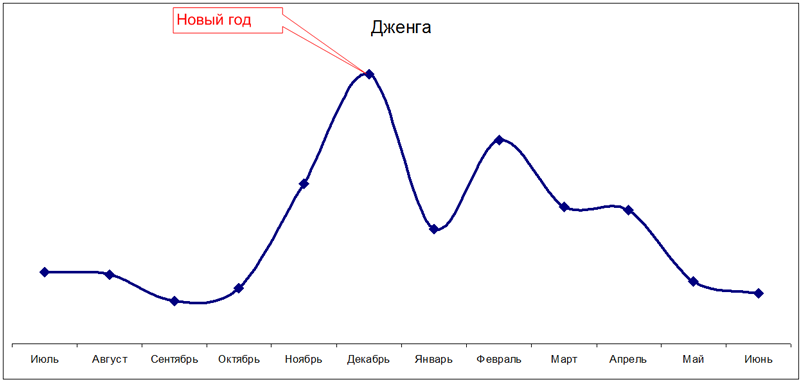
Genga is a seemingly off-season product (well, a tower and a tower), but a distinct peak on March 8 shows that the game is very cool for girls. Actually, we realized this last year, so on the chart at the same time a small effect of local advertising campaigns was added. Another feature of the schedule is the decline last summer. At the same time, there is no such recession on the substitute goods (other packs of Gengi and the Tower, for example) is just a delivery feature: for two years in a row we have a specific crop of Gengi failing because the forests are burning and the Europeans make a beautiful gesture stopping the game production, everything will not go out.

Usually, the peak of wholesale supplier comes a month or half a month before the peak of retail - this is a lag on logistics. Retail sends a pre-order to the supplier so that everyone understands what will happen and how. This is all seen on the chart of Jackal : it is sold as Monopoly, but on holidays it goes above it, because it does not end (the supplier delivers it from the wholesale warehouse for 3 days on orders). Reducing the reaction time means big sales at the peak of the season: after all, if the forecast is wrong (non-order) and the game is dismantled, you can always quickly correct the situation.
In nature, animals act according to a rather interesting algorithm. For example, a bear in its “seasonal peak” is fed up for the future, stores fat and lays down to wait out the seasonal decline. He wakes up in advance, almost a month does not eat anything (only out of interest) and by the beginning of the peak, when normal food begins to appear around, thin and hungry comes. In a business with a pronounced seasonality, it is the same: at the peak money is collected, all expenses from unnecessary expenses are cut during a recession. The only difference is that a business can start a second paradigm with a peak in antiphase: in this case, instead of “hibernation”, it will be necessary to reorganize for another product.
Suppose that you have a task to cut the expenditure statement by 20% (this is a normal figure). The first thing that comes to mind is to stop advertising and remove some of the staff.
This idea is wrong: a normally working advertisement (and it works normally for you, if you are still on the market) brings money. In a recession, you can never cut the costs that bring money. It doesn’t matter how much you pay in absolute value — it’s important how much you get in the form of a profit. Many small business owners are afraid of such risks, so they prefer the option where you can pay 10 rubles and get 14, but not the one where you can pay 20 rubles and get 27 for the same period.
Is it possible to fire staff? Yes, many people do this, for example, they remove almost all movers, drivers and other linear personnel who are not part of the company's main DNA in the off-season. Often - hire some of them after a recession. In such a situation, it is reasonable to act on the anti-crisis recommendations: not to dismiss people, but to shorten working hours. As a rule, for a person, if you choose between 12 shifts a month instead of 15 or a reduction, the first is preferable.
However, sometimes a situation arises when people still need to be fired. There is a golden rule: you can never touch those who think, even if they have not yet had time to really open up. Finding unusual people is more difficult than recruiting line staff, so it’s better to sacrifice several replaceable employees than part with someone who is potentially capable of much. The team is the basis of a successful business, and you just can't bite off your paws.
If you have the opportunity to donate, for example, air conditioning and save staff - it is better to use it. Despite the widespread opinion that the staff is cut first, specifically, we adhere to the opposite position: staff is reduced only when all other possibilities have been exhausted. By the way, this position is important for the trust of your people to you.
It is possible and necessary to cut purchases of goods of groups C and D (these are specialized goods that bring little profit, and non-core goods). In our case, these are the games that are sold the worst of all, rare and very much to the amateur, plus all sorts of strange things that were bought for the experiment. Even better - if the purchase turns out not to cut, and optimize. The fact is that the seasonal decline in the summer also applies to suppliers, so they are willing to make concessions. If you do not take the goods - they will go bankrupt. At the same time, non-top suppliers are well aware that their goods can simply be excluded from the assortment - and they agree to defer payment (after all, after the off-season money will definitely be there), deliveries and many other things that allow you to create unique successful symbiosis when the supplier and retailer support each other during a recession. Of course, at the peak of such conditions from the supplier will never work: he sells as much as he manages to produce.
To the top of the peak all communication channels of the office are checked. Internet access is always duplicated (and in the central office is spent), telephony is duplicated, reserves are checked, backup scripts are tested, system administrators check the integrity of backups of all systems for hot recovery. The call center expands and captures the neighboring departments (they move to other premises). For each service, providers with different hardware bases are selected so that in the event of a major accident, they are at least not immediately two or three (in the off-season, all the excess from this is turned off or put into sleep mode).
The security of the stores is increasing, as revenue grows.
SEO should also be started in the summer: you can make a time-to-money tradeoff and get a normal result to a peak, when the rest just start to panic.
The layout is changing: in the first places in the summer, for example, iron and powerful Petanque, and in the winter - games for indoor premises.
At the peak, everyone should be on the front lines. Buyers, marketing, management and all the rest have long been prepared and just keep abreast of it. They have no current activities, so you can put them in other departments.
At the forefront are call center operators, vendors in stores and a team of events. They can and should be strengthened by other departments. Moreover, any manager simply has to stand "on the front lines" in the store: this is a very important rule that does not allow one to break away from reality.
Our common peak season is December (a similar situation in almost all retail). Therefore, the graph looks like this:
Understanding seasonality gives an understanding of forecasting purchases in retail, the allocation of resources for the IT department and staff, and so on. The first off-season usually becomes fatal for many start-up entrepreneurs, so you need to understand in advance what will happen and be ready to suck your paw a couple of months after a super-successful start. The optimal scheme of work: wildly liven up and prepare for the peak, get the maximum profit, build up fat, survive the recession with minimal losses, go to a new round. If there is an opportunity to find something antiphase (such as summer products for retail with a winter peak) - be activated in this direction.
The most important moment in understanding seasonality for opening a business is the choice of time to start before the season, and not in the middle of a recession.
And one more important: any business is a game. If it becomes clear that something is wrong - you can always stop the current test project, “boot up” by the next season and start anew correctly. By the way, if you're interested, I can tell you how we are constantly starting test projects.

Business Cardiograms
Almost every business - from trade in vodka to IT-projects - has seasonal fluctuations. They need to be taken into account in the cycles of preparation, development, in finance and in technical moments before the peak (such as reservation of channels).
')
Here are a few practical points:
- Start your business at the start of the seasonal peak
It is necessary to know when your sphere is the most “hot”, and to start in such a way that as quickly as possible to “discourage” capital expenditures. The luckiest ones do it in a couple of months. Example: the game is better to release for Christmas, when everyone is looking for gifts. - Push Suppliers During Recessions
Your suppliers (for example, in retail) are ready to make concessions in the off-season - it is extremely important for them not to lose a client. It is in a recession that you need to look for suppliers and seek the best conditions. In the peaks it is useless to do. - Evaluate business by annual cycles.
For example, when evaluating flowers for a period without holidays, we may mistakenly find them unprofitable. The same applies to many outlets. - Remember that the Internet is also seasonal
In Runet, recession happens on New Year's holidays (short) and in summer (long). This greatly affects the display advertising and various actions in social networks.
How to find out your seasonality schedule?
- If the history of their sales is not - ask people in this or related field.
- Order research on the field (for example, there are many open data on the POF website, plus they sell market statistics), or to find market reviews for the past few years and compare. Generally, if you delve into the open FOM documents, you can learn a lot of new and interesting things in principle.
- View Google.Trends and Wordstat Yandex. The last two instruments are closely tied to the network, therefore, only peaks and downturns on the Internet will show that for small cities it is not significant at all. More or less the real picture in the CIS space only for Moscow and St. Petersburg.

Trends of colors (blue graph) and board games. Normalization and overlay: in reality, there are many more colors than board games. Here you can clearly see the difference in phases between the New Year and March 8.

And here is the data of Yandex WordStat for the query “board games”. Across Moscow approximately correspond to the real schedule of demand for these games.
How and what goods to process?
Below are charts of five different products.

The first is Monopoly , it is a “default game” for an abstract average client (the same one, statistically with one breast and one egg). The demand graph of this piece roughly corresponds to the overall demand schedule on the network. It is convenient to know such a reference product in each niche of the market: according to it, it is possible to count the forecasts of new products that are included in this niche. For example, if another Monopoly is released now, we will already know more or less exactly how much and when to buy it.

The second example is Towns . In winter, the sale of Gorodok is almost unreal (although I saw how they were bought after the phrase “What do you mean, it's two bits in the trunk”), but in summer they are at their peak. Approximately the same schedule will be for a product with a similar consumption profile. When we put in the network inhumanly healthy water blasters, we already knew how they would be sold and in what month due to the extrapolation of data on the Towns.

The third example is the game “ For you ”, there are 15 beautiful romantic tasks for a man and a woman there. An obvious peak is the international sexual holidays, especially on February 14 (as suggested in the comments, the signature on the March 8 error is).

On the habraigra “Startup” graph, you can see fluctuations that overlap the seasonal and generally look illogical. These are promotions and promotions. In our particular case - two habraeffekt plus logistic lag for delivery by region. The peak in early summer is a corporate order for gifts to employees and journalists. A start-up is an example of the fact that the season is a season, but promotional activity can safely block all the trends. At the same time, we still do not know the seasonality of the goods, because there are no analogues, therefore, we build the forecast on the basis of the averaged Monopoly.

Genga is a seemingly off-season product (well, a tower and a tower), but a distinct peak on March 8 shows that the game is very cool for girls. Actually, we realized this last year, so on the chart at the same time a small effect of local advertising campaigns was added. Another feature of the schedule is the decline last summer. At the same time, there is no such recession on the substitute goods (other packs of Gengi and the Tower, for example) is just a delivery feature: for two years in a row we have a specific crop of Gengi failing because the forests are burning and the Europeans make a beautiful gesture stopping the game production, everything will not go out.

Usually, the peak of wholesale supplier comes a month or half a month before the peak of retail - this is a lag on logistics. Retail sends a pre-order to the supplier so that everyone understands what will happen and how. This is all seen on the chart of Jackal : it is sold as Monopoly, but on holidays it goes above it, because it does not end (the supplier delivers it from the wholesale warehouse for 3 days on orders). Reducing the reaction time means big sales at the peak of the season: after all, if the forecast is wrong (non-order) and the game is dismantled, you can always quickly correct the situation.
Finance
In nature, animals act according to a rather interesting algorithm. For example, a bear in its “seasonal peak” is fed up for the future, stores fat and lays down to wait out the seasonal decline. He wakes up in advance, almost a month does not eat anything (only out of interest) and by the beginning of the peak, when normal food begins to appear around, thin and hungry comes. In a business with a pronounced seasonality, it is the same: at the peak money is collected, all expenses from unnecessary expenses are cut during a recession. The only difference is that a business can start a second paradigm with a peak in antiphase: in this case, instead of “hibernation”, it will be necessary to reorganize for another product.
What to cut on the decline?
Suppose that you have a task to cut the expenditure statement by 20% (this is a normal figure). The first thing that comes to mind is to stop advertising and remove some of the staff.
This idea is wrong: a normally working advertisement (and it works normally for you, if you are still on the market) brings money. In a recession, you can never cut the costs that bring money. It doesn’t matter how much you pay in absolute value — it’s important how much you get in the form of a profit. Many small business owners are afraid of such risks, so they prefer the option where you can pay 10 rubles and get 14, but not the one where you can pay 20 rubles and get 27 for the same period.
Is it possible to fire staff? Yes, many people do this, for example, they remove almost all movers, drivers and other linear personnel who are not part of the company's main DNA in the off-season. Often - hire some of them after a recession. In such a situation, it is reasonable to act on the anti-crisis recommendations: not to dismiss people, but to shorten working hours. As a rule, for a person, if you choose between 12 shifts a month instead of 15 or a reduction, the first is preferable.
However, sometimes a situation arises when people still need to be fired. There is a golden rule: you can never touch those who think, even if they have not yet had time to really open up. Finding unusual people is more difficult than recruiting line staff, so it’s better to sacrifice several replaceable employees than part with someone who is potentially capable of much. The team is the basis of a successful business, and you just can't bite off your paws.
If you have the opportunity to donate, for example, air conditioning and save staff - it is better to use it. Despite the widespread opinion that the staff is cut first, specifically, we adhere to the opposite position: staff is reduced only when all other possibilities have been exhausted. By the way, this position is important for the trust of your people to you.
It is possible and necessary to cut purchases of goods of groups C and D (these are specialized goods that bring little profit, and non-core goods). In our case, these are the games that are sold the worst of all, rare and very much to the amateur, plus all sorts of strange things that were bought for the experiment. Even better - if the purchase turns out not to cut, and optimize. The fact is that the seasonal decline in the summer also applies to suppliers, so they are willing to make concessions. If you do not take the goods - they will go bankrupt. At the same time, non-top suppliers are well aware that their goods can simply be excluded from the assortment - and they agree to defer payment (after all, after the off-season money will definitely be there), deliveries and many other things that allow you to create unique successful symbiosis when the supplier and retailer support each other during a recession. Of course, at the peak of such conditions from the supplier will never work: he sells as much as he manages to produce.
Technological solutions
To the top of the peak all communication channels of the office are checked. Internet access is always duplicated (and in the central office is spent), telephony is duplicated, reserves are checked, backup scripts are tested, system administrators check the integrity of backups of all systems for hot recovery. The call center expands and captures the neighboring departments (they move to other premises). For each service, providers with different hardware bases are selected so that in the event of a major accident, they are at least not immediately two or three (in the off-season, all the excess from this is turned off or put into sleep mode).
The security of the stores is increasing, as revenue grows.
SEO should also be started in the summer: you can make a time-to-money tradeoff and get a normal result to a peak, when the rest just start to panic.
The layout is changing: in the first places in the summer, for example, iron and powerful Petanque, and in the winter - games for indoor premises.
Personnel Management
At the peak, everyone should be on the front lines. Buyers, marketing, management and all the rest have long been prepared and just keep abreast of it. They have no current activities, so you can put them in other departments.
At the forefront are call center operators, vendors in stores and a team of events. They can and should be strengthened by other departments. Moreover, any manager simply has to stand "on the front lines" in the store: this is a very important rule that does not allow one to break away from reality.
What else is in the off season?
- In the off-season is best to take a vacation . We have a season - summer, so the most buzz rest.
- It is very convenient to patch bugs in moments when sales are low. Since the load is small, you can debug business processes, fix jambs and generally improve all work.
- If you need to reform something in the company or reorganize , it is also better to do it in the off-season, because due to the abundance of free resources of under-employed employees, the subsequent period of confusion will not affect the efficiency of the processes. We refactored the company last year just in the summer.
- You can experiment in marketing with small budgets. Typically, marketing is tied to the constant support of huge sales in the cycle, but in a recession there is a period of 1-2 months, when you can invest a lot of effort in a small budget. At other times it is inefficient: it is better to invest a lot of effort in a campaign with a large budget. Every summer we try new approaches in ATL, BTL, and the network. This year, for example, they opened a club to see what would come of it.
- It is good to do AB tests of various services and advertising in the summer. There is a time and opportunity to compare alternatives. During the season, the load is such that it is simply unrealistic.
- At the end of the recession, we begin recruitment and retail expansion: at the peak, this will come in handy. It is logical to recruit staff a month before it is actually needed - otherwise there is a high risk of recruitment with a decrease in requirements for a person. Less time - less alternatives.
- In the off-season , new points are being opened in retail, and the existing ones are preparing for December: the number of cash desks is increasing, the flow of people inside the shops is calculated, the extra racks and islets are removed, which will delay movement with a large number of visitors.
- In the summer we are engaged in financial and organizational planning . Plans are not always accurately realized when they come into contact with reality (everything changes), but any plan, even in a turbulent market, is better than no one. Plus, the fact is that while the planning process itself takes place, many questions arise that would be better solved in advance. Another way to stumble upon such issues is difficult.
- The most important thing for us in the summer is the development of new products . The production cycle is: mad printing and assembly from September to February, then reviewing new ideas, tests, calculations, developing, printing new products, running them in retail for real demand - and again a crazy cycle with thousands of boxes a day for holidays. Unlike computer games, we do not try to get releases at Christmas: our sales depend little on the announcements of the game and the enthusiasm of the press, but a lot on how much it will become known to the players to peak.
Site
Our common peak season is December (a similar situation in almost all retail). Therefore, the graph looks like this:
- We are experiencing December and January.
- In January, we preserve backup machines deployed for hot swapping and fast scaling in the clouds, reduce the number of replicated bases, leaving only one backup mirror.
- Until mid-March, we are planning a new large project, prototyping and designing new large pages.
- We roll a new major release, refactor and change the engine in the summer.
- In the autumn, we are engaged in introducing new marketing features: as a rule, these are not very large pieces that are screwed up without changing the site's engine. At the same time, we are engaged in the optimization of processes inside, for example, we automate the work of moderators, set up a site with a call center, and so on.
- We are preparing for a peak, completely stop the development of new features and switch to support. We reserve additional power, deploy backup sites, update the “bare” HTML versions in case of site overload, optimize the cache.
- We are experiencing December and January and go to a new round.
Summary
Understanding seasonality gives an understanding of forecasting purchases in retail, the allocation of resources for the IT department and staff, and so on. The first off-season usually becomes fatal for many start-up entrepreneurs, so you need to understand in advance what will happen and be ready to suck your paw a couple of months after a super-successful start. The optimal scheme of work: wildly liven up and prepare for the peak, get the maximum profit, build up fat, survive the recession with minimal losses, go to a new round. If there is an opportunity to find something antiphase (such as summer products for retail with a winter peak) - be activated in this direction.
The most important moment in understanding seasonality for opening a business is the choice of time to start before the season, and not in the middle of a recession.
And one more important: any business is a game. If it becomes clear that something is wrong - you can always stop the current test project, “boot up” by the next season and start anew correctly. By the way, if you're interested, I can tell you how we are constantly starting test projects.
Source: https://habr.com/ru/post/146060/
All Articles